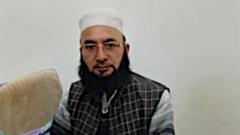The family of Mohammad Iqbal seeks justice and recognition amidst a damaging false narrative that emerged after his death during military conflict between India and Pakistan.
**Misinformation and Grief: The Tragic Case of a Teacher Misidentified as a Terrorist**

**Misinformation and Grief: The Tragic Case of a Teacher Misidentified as a Terrorist**
An Indian teacher killed in cross-border shelling was wrongly labeled a terrorist, igniting outrage over media misinformation.
In a heart-wrenching tale highlighting the impact of misinformation during conflicts, the family of Mohammad Iqbal, a respected teacher in Poonch city of Indian-administered Kashmir, is grappling with their loss and the subsequent defamation that emerged following his tragic death. Iqbal was killed on May 7 during cross-border shelling after India conducted airstrikes against Pakistan in retaliation for a militant attack, which claimed the lives of 26 individuals.
Despite his dedication to education and community, prominent media channels hastily branded Iqbal a terrorist based on superficial markers like his beard and skullcap. This narrative was swiftly debunked by local police, who insisted on Iqbal's innocence and reaffirmed his role as a beloved figure within the community. "My brother was just a teacher... the dead can't defend themselves," said Farooq Ahmed, Iqbal’s brother, who expressed his disbelief at the accusations.
The aftermath of Iqbal's death revealed alarming levels of sensationalism and misinformation permeating the news landscape. This misinformation storm included inaccurate claims about military actions and confusing media narratives that overwhelmed the public. News director at Newslaundry, Manisha Pande, commented on the unprecedented nature of this conflict's coverage, calling attention to the reckless eagerness for viewership that often eclipses journalistic integrity.
As the family mourns Iqbal’s loss, their pain is exacerbated by the false identity that has emerged around him. Legal action against the media outlets that propagated the erroneous narrative is an option, but for now, the focus is on recovery and financial stability. Iqbal, being the sole breadwinner for his family, leaves behind a wife and eight children, while many in society erroneously see him as a terrorist.
"My brother was a quiet, gentle man who loved teaching children," Farooq Ahmed poignantly remarked. Will the world recognize the truth of Iqbal’s identity, or will the wounds inflicted by misinformation endure? The emotional toll taken on families like the Iqbals not only serves as a reminder of the importance of accurate reporting but also as a call for accountability in the media's role during conflict.
Despite his dedication to education and community, prominent media channels hastily branded Iqbal a terrorist based on superficial markers like his beard and skullcap. This narrative was swiftly debunked by local police, who insisted on Iqbal's innocence and reaffirmed his role as a beloved figure within the community. "My brother was just a teacher... the dead can't defend themselves," said Farooq Ahmed, Iqbal’s brother, who expressed his disbelief at the accusations.
The aftermath of Iqbal's death revealed alarming levels of sensationalism and misinformation permeating the news landscape. This misinformation storm included inaccurate claims about military actions and confusing media narratives that overwhelmed the public. News director at Newslaundry, Manisha Pande, commented on the unprecedented nature of this conflict's coverage, calling attention to the reckless eagerness for viewership that often eclipses journalistic integrity.
As the family mourns Iqbal’s loss, their pain is exacerbated by the false identity that has emerged around him. Legal action against the media outlets that propagated the erroneous narrative is an option, but for now, the focus is on recovery and financial stability. Iqbal, being the sole breadwinner for his family, leaves behind a wife and eight children, while many in society erroneously see him as a terrorist.
"My brother was a quiet, gentle man who loved teaching children," Farooq Ahmed poignantly remarked. Will the world recognize the truth of Iqbal’s identity, or will the wounds inflicted by misinformation endure? The emotional toll taken on families like the Iqbals not only serves as a reminder of the importance of accurate reporting but also as a call for accountability in the media's role during conflict.



















